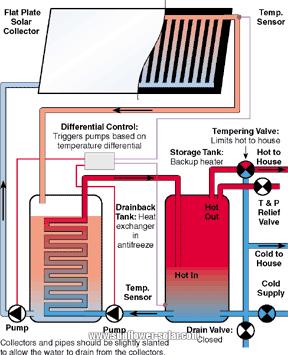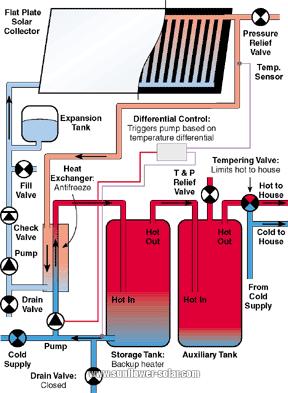The Advantages & Disadvantages of Solar Water Heating System
Author:None
From:None
Post time:04/11/2012
View:15413
Solar Hot Water System Types: Advantages & Disadvantages
|
System Type |
Characteristic & Use |
Advantages |
Disadvantages |
|
Solar Batch Water Heater |
Open loop; Integrated collector & storage; Freeze protection generally limited to infrequent or light freeze climates |
Simple; No moving parts |
Freeze protection typically poor; Inefficient in cold climates; Small systems only |
|
Thermosiphon |
Typically open loop; May be closed loop with heat exchanger & antifreeze |
Simple; Requires no electricity for operation |
Collector must be located below tank; Inappropriate for use with hard water (open loop system) |
|
Direct Pump System |
Open loop; Freeze-free climates |
Flexible placement of tank & collector; can be powered by PV |
No freeze protection; Inappropriate for use with hard water |
|
Direct Pump Recirculation System |
Open loop; Climates where freezing is an unexpected occasion |
Simple; can be powered by PV |
Freeze protection is limited to infrequent & light freezes; Inappropriate for use with hard water |
|
Draindown |
Open loop; Designed to drain water when near freezing |
Can be powered by PV |
Freeze protection is vulnerable to numerous problems; Collectors & piping must have adequate slope to drain; Inappropriate for use with hard water |
|
Closed Loop Heat Exchanger |
Closed loop; Cold climates |
Very good freeze protection; Basic principles well understood by conventional plumbing trades; No problems with hard water; can be powered by PV |
Most complex of all systems, with many parts; Heat exchanger & antifreeze reduce efficiency; Fluid may break down at high stagnation temperatures |
|
Drainback |
Closed loop; Cold climates |
Very good freeze protection if used with antifreeze; No problems with hard water; Simplest of reliable freeze protection systems; Fluid not subject to stagnation temperatures; Simple to homebrew; can be powered by PV |
Heat exchanger & antifreeze reduce efficiency; Collectors & piping must have adequate slope to drain; Requires larger pump to lift |
The Choice is Yours
The system you select, is frost protection are determined first by, whether you need. If you live in a frost-free climate, select a batch heater or small heaters unit for small systems serve one to three persons. Greater demands can direct pumping system with an open loop circulating water from the storage tank on flat platform collectors are met.
If you need to frost or hard water, you choose one of the closed-loop systems with antifreeze and a heat exchanger. Either it is your water without heat fear of frost.
Solar water heating is a good investment. Whether you a do-it-yourselfers with plumbing or want a professional installer, I would recommend a distributor that serves your area. Ask their advice. Find out the products and services that they have to offer, and which is the best solution for your needs and climate. Please contact the American solar energy society or the solar energy industries Association to support the search for a contractor or supplier in your area.
Sidebar 1
Maintain Temperature Stratification in Your Tank
Hot water return from the collector should the tank down from above force about a third of the way to. The water may not be the hottest water collected every day, because sunlight and be different outside temperature during the day. You want this water not to disturb the water at the top of the memory. Water tap for the use of at the top on the tank. This is where it is the hottest.
When hot water from the tank is drawn, it is replaced by new cold water, which should be at the bottom. Circulating water to the solar panel should be drawn from the bottom of the vessel. Why? Efficiency! Always by you collector with the coolest water you have available. The cooler is running a solar collector, the less heat it loses to the environment.
Sidebar 2
Rust Never Sleeps: Open Loop vs. Closed Loop
A "hydronic" system is one that uses a liquid as the heat carrier. Air systems are the most common alternatives to hydraulic systems. Applied systems are almost always as "open loop" or "closed loop" - often referred to as "direct" or "indirect" or referred to categorized. If you don't know the difference between these are, you run the risk of the discovery one day, that your system has been alive a slow but persistent killer-oxygen.
Open Loop

Open-loop systems are a regular supply of oxygen, provide, each corrosive something from cast iron, steel, or other component in your system trash. When you to scoop up water new water at the tap or shower, at the same time to replace them. Along with this new water comes a fresh supply of oxygen.
You have two lines of defense against damage from corrosive oxygen. Can oxygen into the system to prevent or to materials that are resistant to corrosion to use. Bronze, brass, stainless steel, plastic and the glass lining of a tank have no problem with oxygen copper. Use with supplied these materials when dealing with fresh water "open" or "direct" - systems.
Closed Loop
If your system is a "closed system", will be not to worry about oxygen. You will be able be cast components (pumps), which save you money use. Closed systems are loaded with a liquid at the time of installation. New oxygen is not introduced as an integral part of the installed system and corrosion is no problem. Read on and find some examples for open and closed systems to see.
Another important aspect, with open or direct systems is whether you have hard water. In the course of time be lime deposits from hard water clogging the collectors, ruined it. These deposits can be removed with regular use of a descaling solution. But if you have hard water, you will be better off with a closed-loop system.